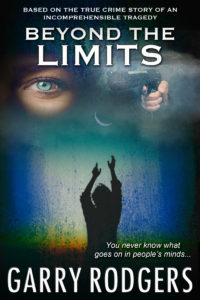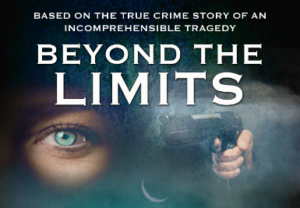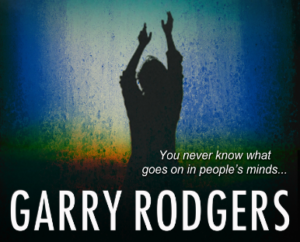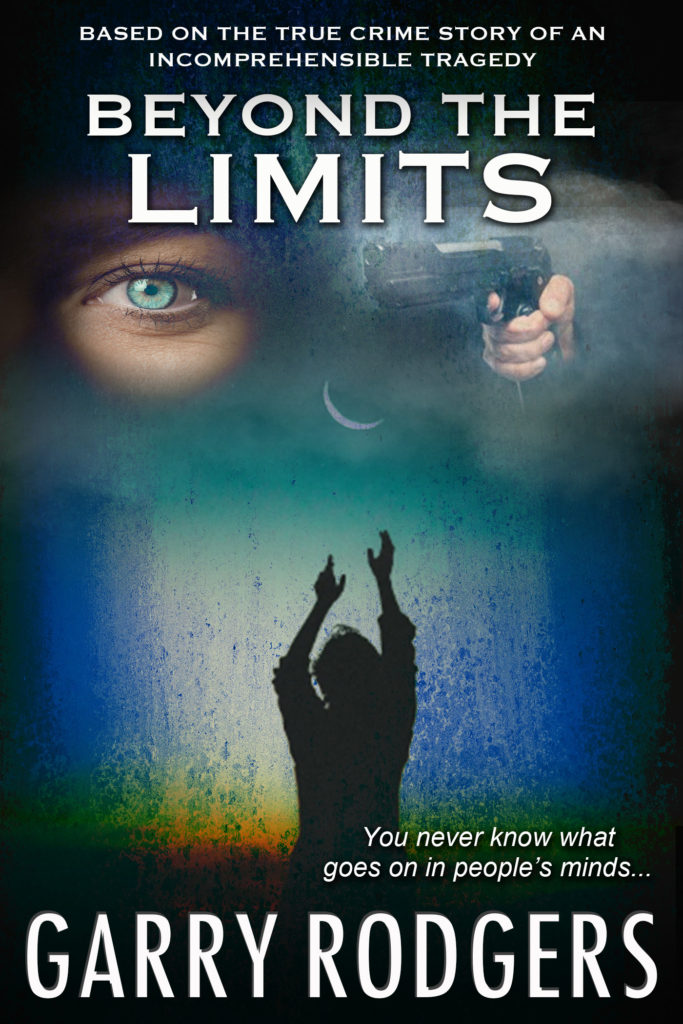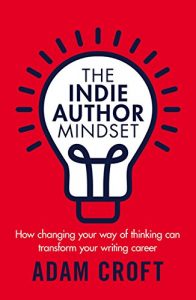 When it comes to being a master of the commercial writing craft, few authors are more successful than Stephen King. The “Horror Guy”, who King calls himself, has tirelessly worked for over sixty years. He’s produced more than fifty novels and countless other pieces in a non-stop career during which he almost died from substance abuse and a nasty vehicle accident. “Prolific” is an understatement when it comes to labeling this writing machine, and there’s a surprisingly simple secret to Stephen King’s success.
When it comes to being a master of the commercial writing craft, few authors are more successful than Stephen King. The “Horror Guy”, who King calls himself, has tirelessly worked for over sixty years. He’s produced more than fifty novels and countless other pieces in a non-stop career during which he almost died from substance abuse and a nasty vehicle accident. “Prolific” is an understatement when it comes to labeling this writing machine, and there’s a surprisingly simple secret to Stephen King’s success.
Yes, the secret to Stephen King’s success is surprisingly simple. It’s a concoction beyond natural storytelling talent, which he has in spades. It’s a mix beyond craft knowledge and prose perfection. And it’s a blend beyond something else—something most writers simply won’t do in their lives. Yet it’s a simple success secret which Stephen King slyly shares if you follow his work.
Before I disclose Stephen King’s s simple success secret, let me tell you what triggered this post. I’m a big Stephen King fan. I’ve read a lot of his stuff—From A Buick Eight is my mind-blowing favorite—and I know many readers can’t Stand him (pun intended). Certainly, he’s verbose compared to James Patterson, but I’m on Team King all the way, even though Team Patterson outsells him.
I connected with a lady who recently retired from the same police force I served with. I didn’t know her directly, but I worked with her dad in the RCMP years ago. She made a career as a detective with Vancouver’s Integrated Homicide Investigation Team (I-HIT) and was their high-profile spokesperson for a long stint. Now this fine lady has a keen interest in beginning a crime-writing career, and she was silly enough to turn to me for advice.
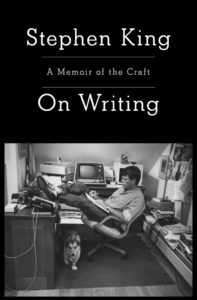 I see piles of potential in this unfolding writer. She has the proper package required to be a commercial success and a household name in crime fiction circles, just as she was in the true crime world. Part of our long talk was me recommending resources to study. Stephen King’s On Writing—A Memoir of the Craft was at the top of the list.
I see piles of potential in this unfolding writer. She has the proper package required to be a commercial success and a household name in crime fiction circles, just as she was in the true crime world. Part of our long talk was me recommending resources to study. Stephen King’s On Writing—A Memoir of the Craft was at the top of the list.
Stephen King. Where do you start to explain his success secret? First, Stephen King is self-made. He didn’t come from writing royalty, and that story of him working nights at a laundry and throwing Carrie in the trash isn’t bullshit. His wife, Tabitha, rescued the manuscript and submitted it to Putnam and the success of Stephen King—writer—began.
Stephen King is coming on to 74. He still writes every day that he can and that includes Christmas and his birthday. Mr. King still finds time to read—lots of reading time—and he generously gives what he has to spare in helping others to develop their writing skills. That includes unfolding writers like my retired detective friend who I hope has redlined, yellow highlighted, and made black ink notes in an On Writing copy as I have.
In prepping this post, I reread On Writing. Or, I should say reviewed my red lines and yellow bars along with black ink notations. I’ve paged this prize at least a dozen times as I’ve built my skills, and I’m now at the point that I can legitimately call myself a commercial writer who’s achieved international bestselling status.
Call me a bragger. Just don’t call me a bullshitter, and I attribute my achievements much to Stephen King’s simple success secret which I’ll keep you in suspense from while I do a quick review of what’s in On Writing and why these pages of gold are so, so valuable for anyone who wants to make it in the commercial storytelling world.
Mr. King wrote On Writing in 2000. At least that’s what the copyright page says. That would have made him around 52 which is 11 years younger than I was when I decided to take writing stories seriously.
On Writing opens with this quote in the foreword: “What follows is an attempt to put down, briefly and simply, how I came to the craft, what I know about it now, and how it’s done. It’s about the day job; it’s about the language.”
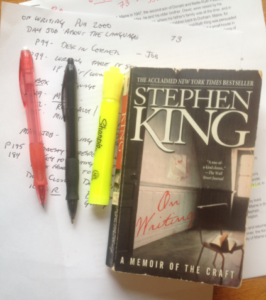 It’s about the day job and it’s about the language. Commercial writing is a job. It’s bloody hard work that requires a writer to show up every day, sit down with their ass in the chair, and put their fingers on the keys—not just when they feel like it or when they think the muse calls. And it’s about using those keys to transcribe language into a crafted story that’s saleable to a mass market.
It’s about the day job and it’s about the language. Commercial writing is a job. It’s bloody hard work that requires a writer to show up every day, sit down with their ass in the chair, and put their fingers on the keys—not just when they feel like it or when they think the muse calls. And it’s about using those keys to transcribe language into a crafted story that’s saleable to a mass market.
Like Stephen King has been doing tirelessly every day for 60 years.
“This is a short book because most books about writing are filled with bullshit. Fiction writers, present company included, don’t understand very much about what they do—not why it works when it’s good, not why it doesn’t when it’s bad. I figured the shorter the book, the less the bullshit.”
On Writing is a short book by Stephen King standards. It runs just shy of 300 pages, but those pages contain sage quotes like these:
“You must not come lightly to the blank page.”
“It’s writing, damn it, not washing the car or putting on eyeliner. If you take it seriously, we can do business. If you can’t or won’t, it’s time for you to close this book and do something else. Wash the car, maybe.”
“Simple sentences worked well for Hemmingway, didn’t they? Even when he was drunk on his ass, he was a fucking genius.”
“I’m convinced that fear is at the root of most bad writing. Good writing is about letting go of fear and affectation. Also about making good choices about the tools you plan to work with.”
 “I love this job. I want you to love it, too. But if you don’t want to work your ass off, you have no business trying to write well—settle back into complacency and be grateful you have even that much to fall back on. There is a muse, but he’s not going to come fluttering down into your writing room and scatter creative fairy-dust over your typewriter or computer. He lives underground. He’s a basement guy. You have to descend to his level, and once you get down there you have to furnish an apartment for him to live in. You have to do all the grunt labor, in other words, while the muse sits and smokes cigars and admires his bowling trophies and pretends to ignore you. Do you think this is fair? I think it’s fair. He may not be much to look at, that muse guy, and he may not be much of a conversationalist (what I get from mine is mostly surly grunts, unless he’s on duty), but he’s got the inspiration. It’s right that you should do all the work and burn the midnight oil because the guy with the cigar and the little wings has got a bag of magic. There’s stuff in there that can change your life. Believe me, I know.”
“I love this job. I want you to love it, too. But if you don’t want to work your ass off, you have no business trying to write well—settle back into complacency and be grateful you have even that much to fall back on. There is a muse, but he’s not going to come fluttering down into your writing room and scatter creative fairy-dust over your typewriter or computer. He lives underground. He’s a basement guy. You have to descend to his level, and once you get down there you have to furnish an apartment for him to live in. You have to do all the grunt labor, in other words, while the muse sits and smokes cigars and admires his bowling trophies and pretends to ignore you. Do you think this is fair? I think it’s fair. He may not be much to look at, that muse guy, and he may not be much of a conversationalist (what I get from mine is mostly surly grunts, unless he’s on duty), but he’s got the inspiration. It’s right that you should do all the work and burn the midnight oil because the guy with the cigar and the little wings has got a bag of magic. There’s stuff in there that can change your life. Believe me, I know.”
“If you want to be a writer, you must do two things above all others. Read a lot and write a lot. There’s no way around these two things that I’m aware of, no shortcut. If you don’t have time to read, you don’t have the time (or the tools) to write. Simple as that.”
“Constant reading will pull you into a place (a mindset, if you like the phrase) where you can write eagerly and without self-consciousness. It offers you a constantly growing knowledge of what has been done and what hasn’t, what is trite and what is fresh, what works and what just lies there dying (or dead) on the page. The more you read, the less apt you are to make a fool of yourself with your pen or your word processor.”
“A radio host once asked me how I write. I answered ‘one word at a time’. Day in and day out. Not surprisingly, it’s that simple. It’s the secret to my success.”
In my humble opinion (IMHO), Stephen King’s surprisingly simple secret to his success as a commercial writer is tirelessness. He’s tirelessly written one word at a time for over six decades and shows no sign of letting up. Long live the King.
———

